
Supporting Ukrainian civil society during Russia’s continued aggression
03/02/2025
Hennadii Vypynashko is a Ukrainian human rights defender who has coordinated the Protection Programme of the Educational Human Rights House Chernihiv for over two and a half years, supporting civil society representatives affected by Russia’s full-scale war in Ukraine. In this interview, he speaks about human rights defenders and journalists, his motivation, and key takeaways from his experience.
Adapting protection work following Russia’s full-scale invasion of Ukraine
Since its establishment in 2014, Educational Human Rights House Chernihiv (EHRHC) has supported human rights defenders and journalists at risk through its Protection Programme. Until 2020, the organisation primarily worked with human rights defenders from Azerbaijan, Belarus, Russia, Uzbekistan, and other countries whose authoritarian regimes persecuted activists and forced people to leave their home countries. Following the crackdown on civil society in Belarus after the 2020 Presidential elections, EHRHC and its partners provided emergency assistance to over 1,000 Belarusian human rights defenders, journalists and activists who were forced to flee their home.
But with Russia’s full-scale invasion of Ukraine in February 2022, EHRHC adapted its work to the emerging situation, while the Protection Programme expanded to include Ukrainian human rights defenders, journalists, civic activists, and their families. Between March 2022 and November 2024, the Programme supported over 1,500 individuals.
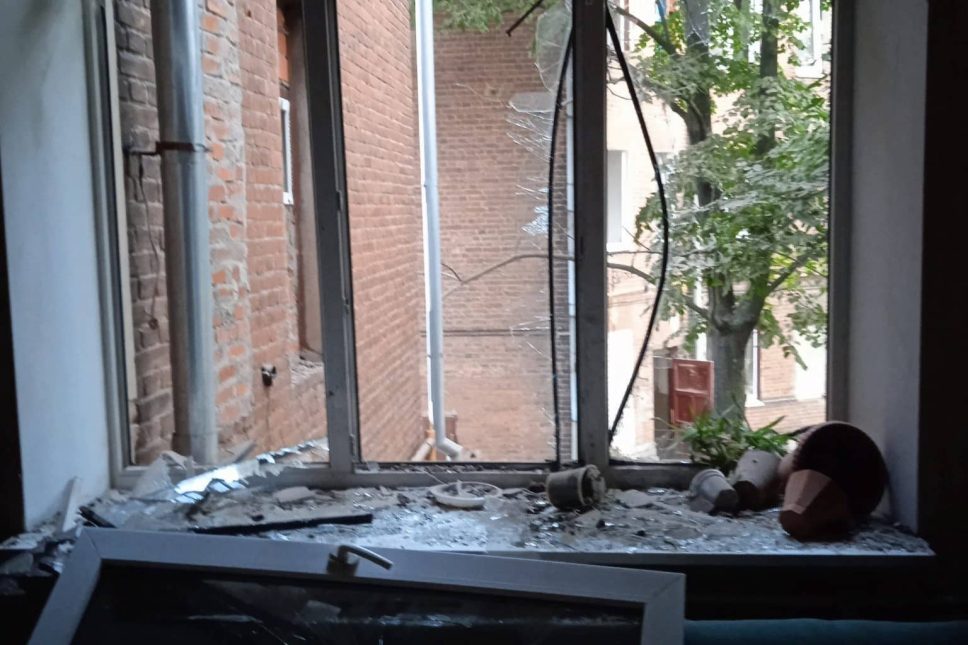
“The Protection Programme’s primary objective is to help human rights defenders, journalists and activists in critical situations so that they can continue their civic activities. In some cases this has meant saving people’s lives,” says Vypynashko.
The Programme provides urgent assistance with relocation, including from the frontline and Ukraine’s Russian-occupied territories, professional support through internships and micro-grants for human rights-related projects, and psycho-social rehabilitation activities and support to help activists recover and build resilience.
“At the start of the full-scale invasion, those urgently evacuating often had nothing,” Vypynashko recalls. “We addressed such needs at the emergency hub in Lviv, where people could also stay for a few days to determine their next steps.”
Later, as the situation stabilised, the Programme expanded to include capacity development support, while a high demand for housing and medical expense support remained.
“Health is a separate issue – both psychological and physical health have been deeply affected for everyone.”
Emergency support for civil society
Vypynashko initially joined EHRHC as a coordinator for professional support for human rights defenders in early February 2022, shifting from his occupation in Ukraine’s judicial system.
“My first interactions with human rights defenders and activists in exile, at that time from Belarus and Chechnya, were very inspiring, we were trying to help them to sustain. However, everything changed with the full-scale invasion on 24 February 2022, when Chernihiv came under fire.”
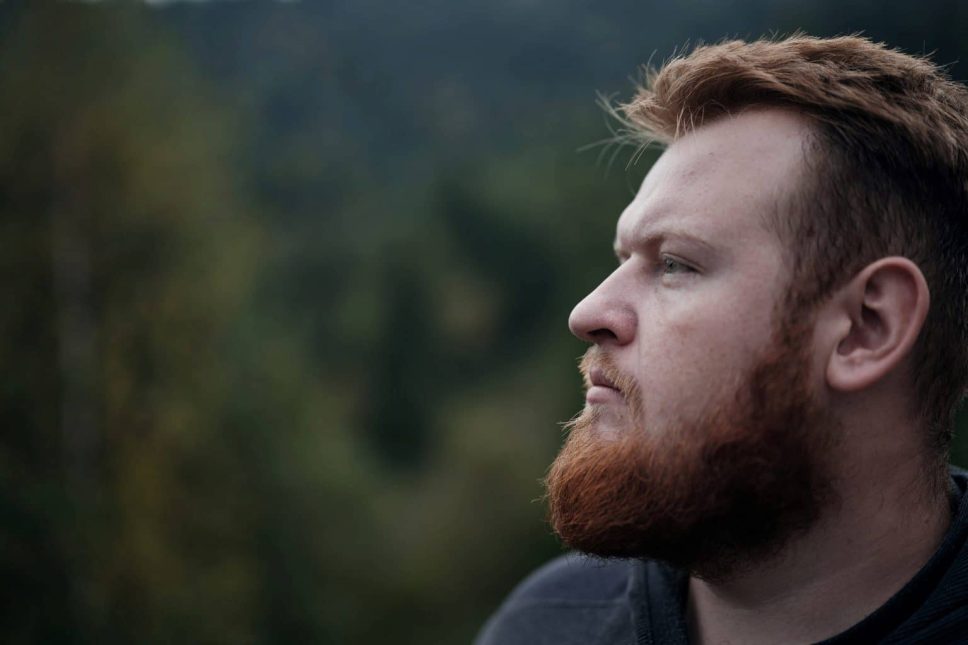
“The EHRHC team relocated to safer places, and by the end of March 2022, we began processing emergency support applications,” he says. “The team handled these applications in turns because there were so many. Part of the team focused on documenting war crimes, and I volunteered to coordinate the emergency support efforts.”
Vypynashko says those who need support might include “human rights defenders, volunteers, civic activists, journalists, someone advocating for the release of civilians from captivity, or assisting IDPs. They might be IDPs themselves, working in hard-to-reach areas, in active combat zones, grey zones, or areas under constant shelling. They might face various risks and pressures, including having survived captivity and torture.”
Vypynashko’s motivation is deeply personal. “I remember how difficult it was for my family. I recall how [during the siege of Chernihiv] we were left without electricity, without heat, in a basement, not knowing how long it would last. My wife was pregnant at the time. I queued for seven hours to buy bread because of airstrikes nearby. Knowing that lists of civic activists, including our team, were being targeted in case of occupation – this motivated me to help those in similar situations.”
“I also understood how difficult it is to become an internally displaced person (IDP) after forced relocation.”
For Vypynashko, working on emergency support has always been particularly meaningful, especially helping those whose homes were destroyed or damaged.
“In August 2022, a Russian Iskander missile struck the dormitory building across from my family home, completely destroying it and killing people. My grandmother was lucky to lean down, the windows were shattered by missile fragments and miraculously she remained unharmed. My house sustained significant damage.”
Stories of impact from Ukrainian civil society at risk
“Each case resonates in its own way, and over time, we’ve gathered many remarkable stories,” Vypynashko says. “Every time we receive feedback expressing gratitude or news that someone was able to keep living, working, and continuing their civic activism is very special for our team.”
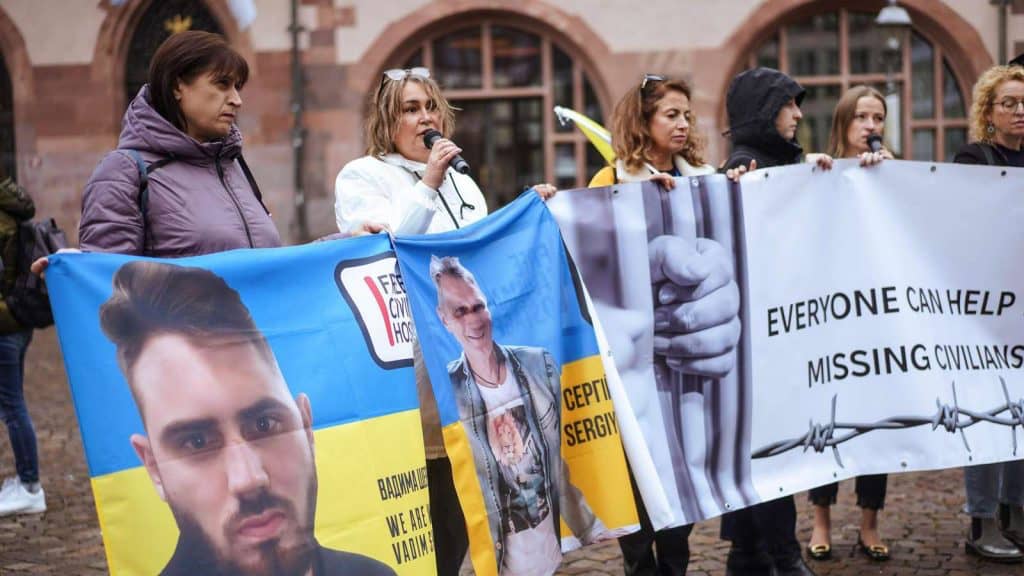
One example is journalist Maryna Savchenko, who lived and worked under occupation in Kherson before escaping and receiving the Programme’s support. Savchenko said the assistance was extremely important and allowed her “to afford to keep working normally after relocating”.
Another case was the support of Olena Tsyhipa, an activist of the NGO ‘Civilians in Captivity’, and the project ‘Please, Free the Birds’, advocating for the release of civilian hostages, including her husband, a journalist and political prisoner Serhiy Tsyhipa, sentenced to 13 years on espionage charges by Russia.
“Tsyhipa approached us several times and received support through internship, mentorship, and psychological help,” says Vypynashko, “She told us that the mentoring sessions helped her articulate and work through anxieties and to gain techniques for grounding in the ‘here and now’.”
Among the micro-projects supported by the Programme, the relocation of the newspaper Vorsklastands out. Operating near the Russian border, the newspaper’s office was severely damaged earlier this year. With support from EHRHC and ZMINA, the team relocated and resumed journalistic activities, providing vital information to displaced populations.
“This newspaper was the only source of information for many in the border region, covering evacuation procedures, finding missing relatives, accessing pensions for displaced persons, etc, while countering Russian propaganda,” shared Vypynashko.
The newspaper’s editor Olekseii Pasiuha says the support was critical: “Having lost our premises, with some equipment destroyed by enemy shelling, and facing the loss of subscribers and advertisers while in evacuation, we were uncertain about resuming operations. This project became a lifeline, enabling us to sustain our work, continue publishing… and had a significant impact on the lives of IDPs by delivering vital information.”
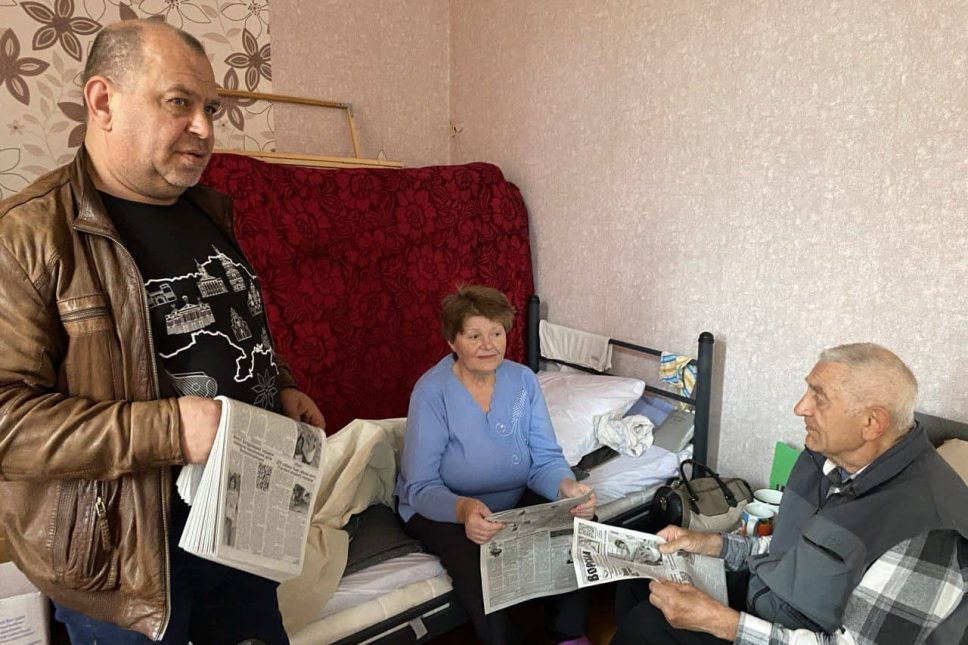
Making hard decisions as demand for support increases
“Unfortunately, there have been many difficult decisions due to the criteria or funding limitations,” Vypynashko admits. “In October, we received applications from a civil society organisation in Pokrovsk operating in an active combat zone. They provide various types of support, including consultations, evacuation, and humanitarian assistance to affected populations. Due to the Programme’s criteria, we could only support three out of seven requests, taking into account factors such as proximity to combat zones, the level of risk to life, and the ability to continue civic activities.”
“When someone has lost everything and doesn’t know what comes next, they need a firm point to lean on… But we do not leave people without hope. In such cases, we try to redirect them to organisations that can help. For instance, to evacuate a volunteer from Bakhmut – a city that no longer exists – we contacted colleagues from East SOS. Recently, we also received a request for temporary relocation abroad so that a human rights defender could change their surroundings and recover emotionally. We referred this request to Front Line Defenders, and I am very grateful for their work and micro-grants, which also help civil society in Ukraine.”
Vypynashko notes an increasing demand for support: “I believe the biggest factor influencing the number of support requests is the frontline. The larger the frontline, the more territories are captured, and the more shelling occurs, the greater the number of people seeking help.”
Spikes in applications often coincide with missile attacks or sudden advances in hostilities near areas where human rights defenders or journalists are active. “Such developments force them to make difficult decisions – whether to continue their work under such conditions, stay, or leave, which leads to a variety of types of support requests.”
From September to mid-November 2024, the Programme received over 70 emergency support requests related to safety. “Unfortunately, funding was only sufficient to cover 43 of these requests,” Vypynashko notes.
Building resilience and capacities
The work can be emotionally draining, affecting the team’s state of mind and, consequently, the effectiveness of support provided to those in need.
Vypynashko highlights the importance of psychosocial rehabilitation, self-awareness, and team support for those providing support to others: “Taking breaks is a must – you need time to exhale and decompress. After all, how can I help others if I can’t take care of myself?” he asks.
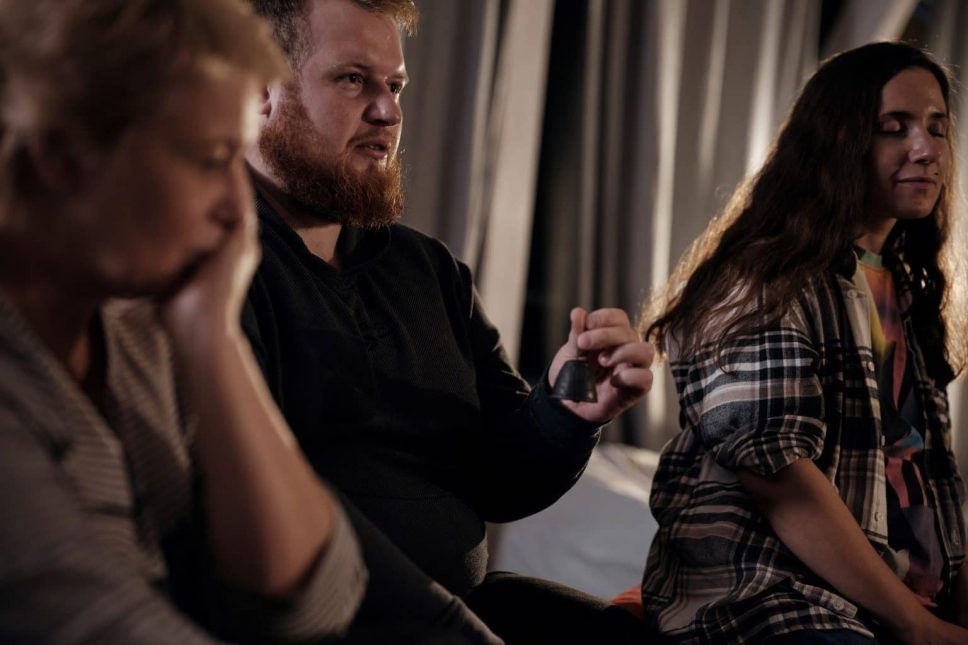
Retreats organised by Tbilisi Shelter City, People in Need, and AHALAR over the last two and a half years have been invaluable. “Each of these was vital for restoring balance, which often erodes between life and work, especially when working hours are undefined. During these retreats, you also share experiences and learn from others’ insights about working in critical situations.”
“I try to focus on self-observation while working with beneficiaries: noting what emotions arise, what I feel in the moment, whether I can truly support the person here and now, or if I need to take a pause or simply remain silent, while being present for those who need it. This approach benefits not only the person but also yourself.”
Finalising implementation of the Emergency Support Ukraine (ESU) project as part of the Protection Programme, Vypynashko and his colleague received support via therapy sessions. “It was crucial to process and contain all the information received from those we supported, so that it would not become overwhelming.”
Vypynashko also participated in an English language course for human rights defenders from the Network of Human Rights Houses supported within ESU.
“I can already see the difference and growth in my ability to express myself so that colleagues not only from the region where I work but also on the international level could understand me and I could understand them.”
Vypynashko says that international support and experience-sharing are crucial to protection work. Working with colleagues from the Human Rights House Foundation and the Network of Human Rights Houses often helped to determine the best way to address situations while offering a fresh perspective.
“A highlight for me was participating in the international trips where we could showcase the results of our work and exchange experience with colleagues during the Network Meeting and Protection Seminar in Warsaw in 2023 and the final meeting with ESU project partners in Lyon in 2024. Feeling the solidarity and support for the Protection Programme from the international civil society community left me inspired and energised upon returning.”
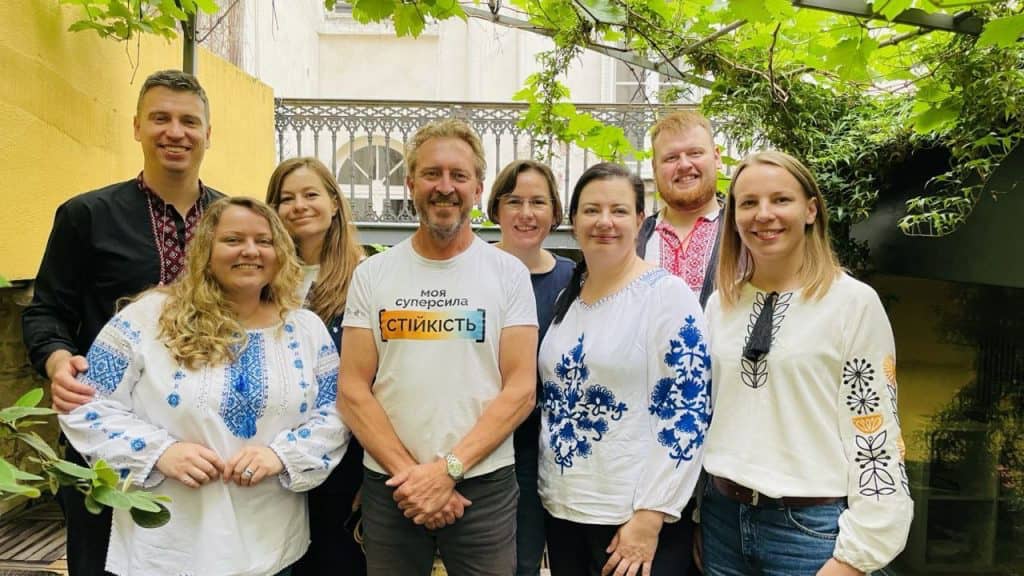
Hope for the future
Vypynashko emphasises the importance of outreach and support: “HRDs and activists should not be left alone. I want them to feel they can reach out for support. I urge everyone in such situations: if you feel unwell, if troubling thoughts fill your head, if you doubt yourself or feel lost, please seek help. We live in a developed society where there are people who will understand and who can help.”
Speaking about the Protection Programme, he notes: “In such challenging and uncertain times, I long for some stability, something to lean on. Such programmes cannot completely eliminate risks and challenges – such a goal is impossible right now – but they undeniably help to prevent collapse.”
“When we survey beneficiaries [of the Protection Programme] and ask whether they were able to continue their civic activities after receiving support, over 90% say yes. This prompts reflection – how many wouldn’t have managed without the support or if it had been less comprehensive? I believe only about 30% would.”
“Funding such programmes is extremely important,” he concludes. “They often meet the urgent needs of affected members of civil society. When such people remain empowered to bring change, those changes can happen. And without such people, what changes could we possibly talk about?”
The Educational Human Rights House Protection Programme operates with the support of the Human Rights House Foundation. From June 2022 till November 2024 it was implemented within ESU project. Emergency Support Ukraine is a regional project that provides opportunities for emergency support for Ukrainian civil society and independent media in the wake of the full-scale Russian invasion. ESU is funded by the European Union and implemented by ERIM-led coalition of partners including Human Rights House Foundation.
The original story published by the Human Rights House Foundation
Stories
-
Katarina Mathernova: If Ukraine had a human face and a human spirit, it would be 10-year-old Roman Oleksiv
-
A regional mission to drive social entrepreneurship: the story of Ksenia Kosukha
-
EU restores safe water supply for 100,000 Ukrainians affected by war
-
Promoting IT during the war: Lviv IT cluster and how EU4Digital helps
-
Frontline digitalisation: Kharkiv IT Cluster collaborations
-
How EU4Youth is driving opportunity and success among young Ukrainians